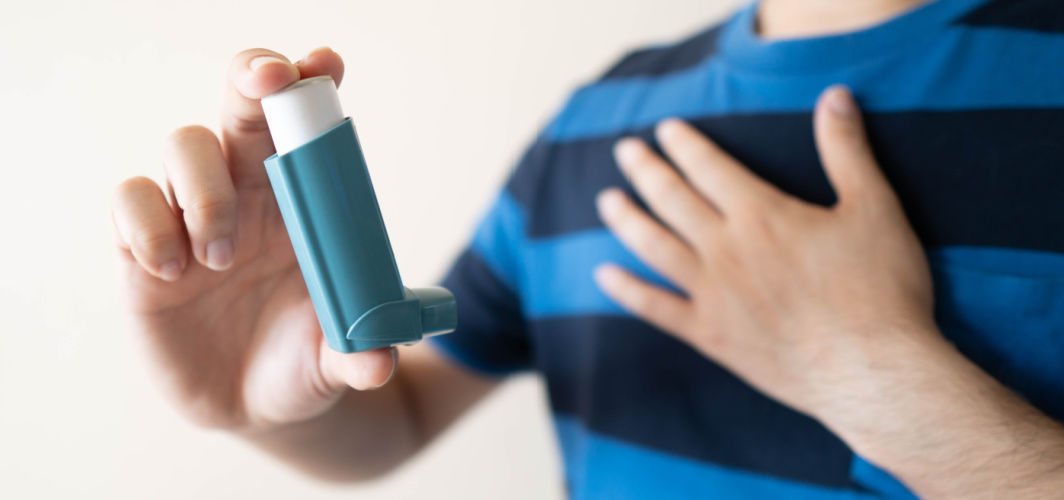Respiratory Health
Everything You Need to Know About Asthma Inhalers
10 min read
By Apollo Pharmacy, Published on - 19 October 2023
Share this article
0
0 like

Managing asthma is crucial for maintaining good respiratory health and preventing exacerbations. Proper asthma management involves identifying triggers, taking preventive measures, and using appropriate medications. Inhalers are the cornerstone of asthma treatment and provide targeted asthma medication delivery directly to the airways. With a variety of asthma inhaler brands available in India, it is important to consult with your doctor to find the inhaler that suits your needs best. Remember, effective asthma management can help you lead a normal life while minimising the impact of this condition.
What is Asthma?
Asthma is a chronic respiratory condition that affects the airways, making breathing difficult. According to recent studies, around 8-10% of adults and 15-20% of children in India have asthma.
1. Common Triggers of Asthma
Asthma triggers vary from person to person but can include allergens like:
- Dust mites
- Pollen
- Pet dander
- Air pollution
- Respiratory infections
- Exercise
- Stress
It is essential to identify and avoid these triggers as much as possible to prevent asthma attacks. If triggers cannot be completely avoided, doctors may recommend using medications such as asthma pumps or asthma puffers to manage symptoms effectively.
2. Symptoms of Asthma
Wondering what asthma breathing is like? When exposed to the triggers, individuals with asthma experience symptoms such as:
- Coughing
- Wheezing
- Shortness of breath
- Chest tightness or pain
3. Importance of Early Diagnosis
Early diagnosis and proper management are crucial in controlling asthma symptoms and improving the quality of life. With early diagnosis, doctors can determine the most appropriate treatment plan tailored to the individual's needs. Regular check-ups are essential to monitor lung function, adjust medication dosages if needed, and provide education on asthma management.
Types of Asthma Inhalers
Asthma inhalers come in various types, each designed to deliver different medications and suit individual needs. Here are common types of asthma inhalers:
1. Quick-relief Inhalers
Quick-relief inhalers provide immediate relief from asthma symptoms. They are short-acting beta-agonists and work by relaxing the muscles in the airways, allowing them to open up and making it easier to breathe. These inhalers are typically used on an as-needed basis when symptoms arise.
However, it's important to note that these inhalers should not be used as a long-term solution for asthma control.
2. Long-term Control Inhalers
Long-term control inhalers, such as inhaled corticosteroids, play a key role in managing asthma daily. Inhaled corticosteroids work by reducing inflammation and swelling in the airways, helping prevent asthma symptoms and attacks from occurring.
Regular use of these inhalers may help keep your asthma under control by reducing the frequency and severity of symptoms. They can also reduce the risk of asthma exacerbations and hospitalisations.
However, long-term control inhalers are not meant for immediate relief during an asthma attack. If you are experiencing worsening symptoms or an asthma attack, it's crucial to have a quick-relief inhaler on hand for immediate relief.
How to Choose the Right Inhaler?
Choosing the right inhaler is crucial for managing asthma effectively. Here are steps to help you make an informed decision:
1. Factors to Consider When Selecting an Inhaler
Consider the following factors when choosing an inhaler:
- Age Group: Different inhalers have different techniques for administration. It's important to select an inhaler according to your age that is easy to use and suits your ability. For example, for young children parametric inhalers would be appropriate and for the elderly, inhalers with clear dose counters would be suitable.
- Severity of Asthma Symptoms: The severity of your asthma symptoms will determine the type of inhaler you need. Individuals with mild symptoms may benefit from a basic inhaler, while those with more severe symptoms may require a combination inhaler.
- Cost and Accessibility: Inhalers can vary in cost, and it's essential to consider your budget. Additionally, ensure that the inhaler you choose is readily available.
2. Different Types of Inhalers Available in India
There are two forms of inhalers available in the market: asthma preventer inhalers and reliever inhalers. Asthma preventer inhalers are used as part of long-term asthma management to prevent or control inflammation and reduce the frequency and severity of asthma symptoms. While reliever inhalers are used for immediate relief of acute asthma symptoms, providing bronchodilation to quickly open the airways. In India, there are three main types of inhalers available. These are:
- Metered-dose Inhalers (MDIs): These are the most common types of inhalers. They deliver medication in a specific dose with each puff. MDIs require proper coordination between inhalation and activation, making it important to use a spacer device for better drug delivery.
- Dry Powder Inhalers (DPIs): DPIs deliver medication in a dry powder form. They do not require coordination between inhalation and activation, making them easier to use for some individuals.
- Soft Mist Inhalers (SMIs): SMIs release medication as a slow-moving mist, making it easier for some people to inhale the medication.
How to Use an Inhaler Correctly?
Using an inhaler correctly is crucial for ensuring that the medication reaches your lungs and is effective in managing your respiratory condition.
1. Step-by-Step Guide for Using an MDI
Here's a step-by-step guide on how to use an inhaler correctly:
- Shake the inhaler well before use.
- Remove the cap and hold the inhaler upright.
- Breathe out slowly and completely.
- Place the mouthpiece between your teeth, sealing your lips around it.
- Start inhaling slowly and deeply as you press down on the canister.
- Continue inhaling deeply and hold your breath for 10 seconds.
- Remove the inhaler from your mouth and exhale slowly.
- Wait for 30-60 seconds before taking another dose.
2. Instructions for Using a DPI
Here's how to use a DPI correctly:
- Hold the inhaler upright with your thumb on the base and index and middle fingers on the sides.
- Load a dose by sliding or twisting the lever, depending on the specific DPI design.
- Exhale fully and seal your lips around the mouthpiece without covering any air vents.
- Inhale forcefully and deeply through your mouth, ensuring that you activate the device properly.
- Hold your breath for 5-10 seconds, then exhale slowly.
Remember not to shake DPIs, as they don't contain propellants like MDIs do.
3. Tips for Proper Inhaler Technique
Here are some tips to help you use your inhaler correctly:
- Read and follow the instructions provided with your specific inhaler.
- Use a spacer device if prescribed, as it can make inhalation easier and more effective.
- Rinse your mouth with water after using a corticosteroid inhaler to prevent oral thrush.
- Prime your inhaler if required, by following the manufacturer's instructions.
- Keep track of the number of doses remaining to ensure timely refills.
- Avoid blocking the air vents on DPIs or covering the mouthpiece on MDIs.
- Regularly clean your inhaler device as per the manufacturer's recommendations.
Managing Asthma with Inhalers
Managing asthma with inhalers is a key component of controlling the symptoms and improving the quality of life for individuals with asthma. Here are tips on managing asthma using inhalers:
1. Creating an Asthma Action Plan
Creating an asthma action plan with your doctor is crucial for effectively managing your asthma. This plan outlines the steps to take during different situations, such as when your symptoms worsen or if you have an asthma attack. It includes specific instructions on when and how to use your asthma inhaler, as well as when to seek medical help.
2. Developing a Routine for Using Inhalers Effectively
It's important to develop a routine for using your asthma inhaler to ensure that you're getting the maximum benefit from your medication.
- Start by reading the instructions provided with your inhaler and ask your doctor for guidance if needed.
- Proper technique, such as coordinating your breathing with each puff, can significantly improve drug delivery to your airways.
3. Tracking Asthma Symptoms
Always keep a record of when and where your symptoms occur, along with any potential triggers you might have been exposed to. This information will help both you and your doctor make informed decisions about adjusting your treatment plan or avoiding trigger exposures.
Lifestyle Modifications for Asthma Management
Lifestyle modifications play a crucial role in managing asthma and reducing the frequency and severity of symptoms. Here are lifestyle changes that can contribute to better asthma management:
1. Maintaining a Healthy Environment
Maintain a healthy home environment by keeping the air clean by regularly vacuuming and dusting, using air purifiers, and ensuring proper ventilation. Avoid using harsh chemicals or scented products that can irritate the airways.
2. Regular Exercise
Regular exercise and physical activity are beneficial for individuals with asthma. Engaging in activities like swimming, walking, or yoga can help improve lung function and reduce asthma symptoms.
3. Dietary Recommendations
A healthy diet can play a significant role in managing asthma symptoms.
- Include fruits, vegetables, whole grains, and lean proteins in your diet to support overall lung health.
- Omega-3 fatty acids found in fish have anti-inflammatory properties that may help reduce airway inflammation.
- Also, avoid foods like dairy products, processed foods, and food additives that may trigger allergic reactions or worsen symptoms.
Common Myths and Misconceptions about Asthma Inhalers
Some common myths and misconceptions about asthma inhalers include:
Myth 1: Inhalers are Addictive
Asthma inhalers contain medications that help open up the airways and reduce inflammation, allowing individuals to breathe more easily. These medications are not addictive and do not create any physical or psychological dependence.
Myth 2: Inhalers are Only for Severe Asthma Cases
This is another common myth which is not true. Inhalers are a cornerstone of treatment for all types of asthma, ranging from mild to severe. By using an inhaler as part of a comprehensive asthma management plan, individuals with mild or intermittent asthma can effectively control their symptoms and prevent exacerbations.
Myth 3: Using an Inhaler Means Your Asthma is Not Under Control
Contrary to popular belief, using an inhaler does not necessarily indicate that your asthma is not under control. Asthma is a chronic condition that requires ongoing management, even when symptoms are well-controlled. Regular use of an inhaler can help individuals with asthma lead normal lives and minimise the need for rescue medications.
Myth 4: You Cannot Use an Inhaler during Pregnancy
Using asthma inhalers during pregnancy is generally safe and recommended to manage asthma symptoms. It is crucial to control your asthma during pregnancy to ensure optimal oxygen supply to the baby. However, consult your doctor to determine the right type of inhaler and medications for you.
Myth 5: Inhalers are Not Safe for Children
Inhalers are safe and effective for children with asthma when used as prescribed by a doctor. Children can use asthma inhalers with the help of a spacer device or mask.
Myth 6: You can Use Herbal Remedies instead of Inhalers
Herbal remedies cannot replace asthma inhalers as a primary treatment for asthma. Herbal remedies lack scientific evidence regarding their effectiveness in treating asthma symptoms. Additionally, relying solely on herbal remedies may delay appropriate medical treatment and put individuals at risk of worsening asthma attacks.
Conclusion
Taking control of your asthma management requires making informed decisions about your treatment plan. We have also discussed the different types of asthma medications, including the commonly used asthma inhalers (asthma pumps or asthma puffers). Understanding the proper use of asthma pumps/asthma puffers and following the prescribed regimen is vital for effective symptom control and prevention of asthma attacks. It is crucial to remember that each individual's asthma is unique, and what works for one person may not work for another. Therefore, seeking guidance from a doctor is essential to determine the most suitable asthma medications, including the type of inhaler and dosage.
FAQs
Q. Are all asthma inhalers the same?
No, there are different types of asthma inhalers available. Some are used for quick relief during an asthma attack (reliever inhalers), while others are used daily to prevent symptoms (preventer inhalers).
Q. Which asthma inhaler brands are commonly used in India?
In India, commonly used asthma inhaler brands include Seroflo, Foracort, and Asthalin.
Q. Can I use my asthma inhaler even when I don't have symptoms?
If your doctor has prescribed a preventer inhaler, it is important to use it regularly, even when you don't have symptoms. This helps prevent future asthma attacks.
Q. Can I share my asthma inhaler with someone else?
No, it is not advisable to share your asthma inhaler with anyone else. Inhalers are prescribed specifically for individual patients based on their condition and dosage requirements.
Q. Are there any side effects of using an asthma inhaler?
Some people may experience side effects such as throat irritation or tremors when using an asthma inhaler. However, these side effects are usually mild and temporary.
Respiratory Health
Consult Top Pulmonology Respiratory Medicine Specialists
View AllLeave Comment
Recommended for you

Respiratory Health
Is Your Blood Oxygen Saturation Level Safe?
In people with chronic lung conditions such as asthma, COPD, and more recently COVID-19, the blood oxygen levels may drop below the desired levels requiring prompt medical attention.

Respiratory Health
Types of Asthma: Classification & Severity
Know about the different types of asthma and their severity levels. Discover the latest guidelines, technologies, and lifestyle factors to manage asthma effectively.

Respiratory Health
World Pneumonia Day: Here Are The Early Signs And Home Remedies
Pneumonia is very common and is the second most common for hospitalisation. Here’s all you need to know about its symptoms, treatment and prevention!
Subscribe
Sign up for our free Health Library Daily Newsletter
Get doctor-approved health tips, news, and more.
Visual Stories

8 Healthy Foods for Asthma
Tap to continue exploring
Recommended for you

Respiratory Health
Is Your Blood Oxygen Saturation Level Safe?
In people with chronic lung conditions such as asthma, COPD, and more recently COVID-19, the blood oxygen levels may drop below the desired levels requiring prompt medical attention.

Respiratory Health
Types of Asthma: Classification & Severity
Know about the different types of asthma and their severity levels. Discover the latest guidelines, technologies, and lifestyle factors to manage asthma effectively.

Respiratory Health
World Pneumonia Day: Here Are The Early Signs And Home Remedies
Pneumonia is very common and is the second most common for hospitalisation. Here’s all you need to know about its symptoms, treatment and prevention!


